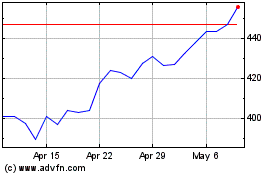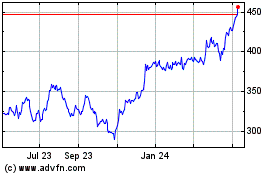Count Goldman's Millionaire Clients as Big Winners on Uber
May 08 2019 - 1:12PM
Dow Jones News
By Liz Hoffman
Wealthy clients of Goldman Sachs Group Inc. will emerge with
deeply discounted stakes in Uber Technologies Inc. when it goes
public this week, placing them among the biggest winners in a deal
full of them.
In 2015, Uber raised $1.6 billion from Goldman's private-wealth
clients by selling them debt that would convert into stock at a
discount to the eventual IPO price. The discount grew the longer
Uber stayed private and now stands at 40%, including accrued
interest, according to investor documents and people familiar with
the matter.
That will translate into a 3.4% stake in Uber, worth $2.7
billion at the middle of the expected IPO price range -- a $1
billion paper profit in 4 1/2 years.
Uber will mint plenty of millionaires when it debuts on Friday.
Employees, early Silicon Valley backers and mega-investor SoftBank
are all poised for big gains on their stakes in the money-losing
company. Goldman itself has a small stake that will be worth about
$500 million at the IPO, courtesy of its investment bankers'
unusual side hustle as venture capitalists.
That investment is distinct from the convertible bonds, which
Goldman bought on behalf of private-bank clients. Goldman's
partners have tens of millions of dollars invested alongside them.
The fund's name, DRT Investors, is rumored internally to stand for
"Don't Ride Taxis," a plug for Uber's business model.
Goldman earned a $65 million fee for placing the bonds, which
were marketed as a sort of apology to clients following a canceled
offering of private Facebook Inc. shares in 2012, according to
people familiar with the matter. In that deal, Goldman's overseas
clients and partners got pre-IPO shares of the social network but
in the U.S. were cut out.
The Uber bonds initially earned interest of 2.5%, rising to
12.5% this year and giving their holders extra rights if the
company dragged its heels on an IPO past next year, according to
investor documents.
Goldman can't sell its Uber shares for six months and the
individual investors are barred from entering into hedges or any
other transactions to lock in their gains in the meantime,
according to people familiar with the terms.
A hedge between two large investors in rival ride-sharing app
Lyft Inc. is thought to have contributed to Lyft's share-price
slide following its March debut. Uber re-examined its own
agreements with investors as it prepared to go public, The Wall
Street Journal has reported.
Goldman's multiple roles could put the bank in a tricky spot,
especially if demand for the shares is soft or early trading is
bumpy.
Along with lead underwriter Morgan Stanley, it is responsible
for helping to set the price at which Uber shares will list,
balancing the company's need to raise cash with a desire to have
the shares trade up. (Morgan Stanley also manages a client fund
that owns Uber shares.)
The gains will come at a good time for Goldman, which is looking
to raise more client money for alternative investing funds across
real estate, private equity and credit.
Write to Liz Hoffman at liz.hoffman@wsj.com
(END) Dow Jones Newswires
May 08, 2019 12:57 ET (16:57 GMT)
Copyright (c) 2019 Dow Jones & Company, Inc.
Goldman Sachs (NYSE:GS)
Historical Stock Chart
From Mar 2024 to Apr 2024

Goldman Sachs (NYSE:GS)
Historical Stock Chart
From Apr 2023 to Apr 2024
